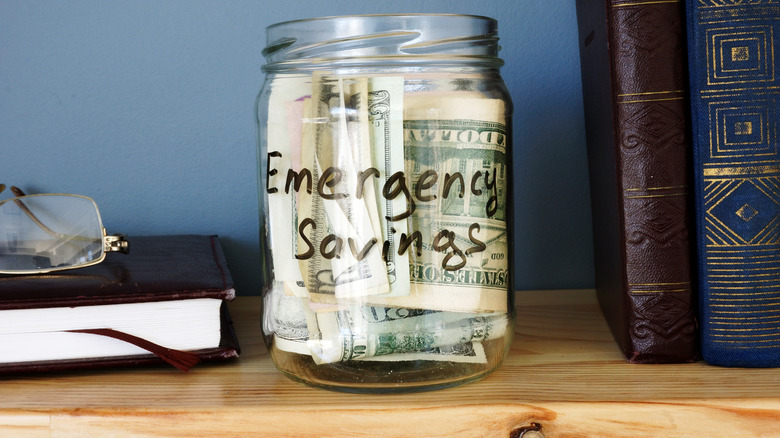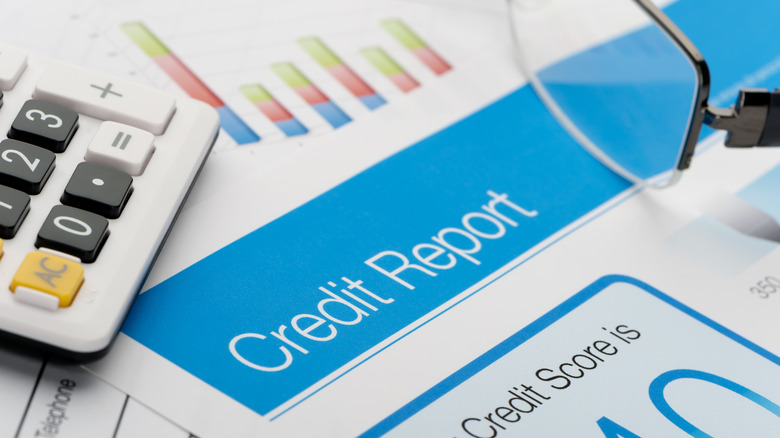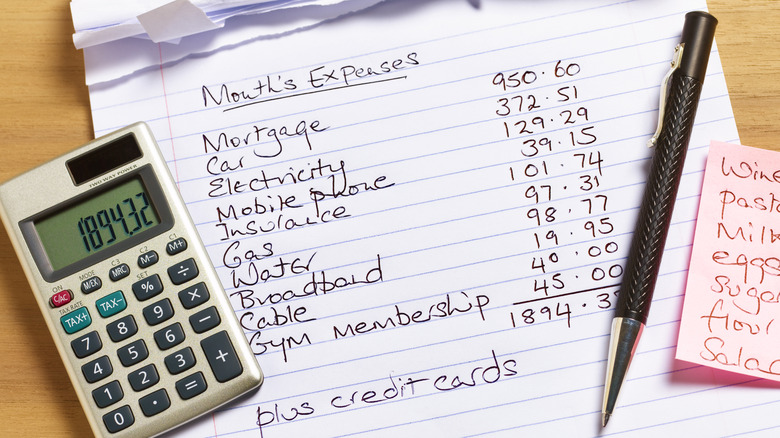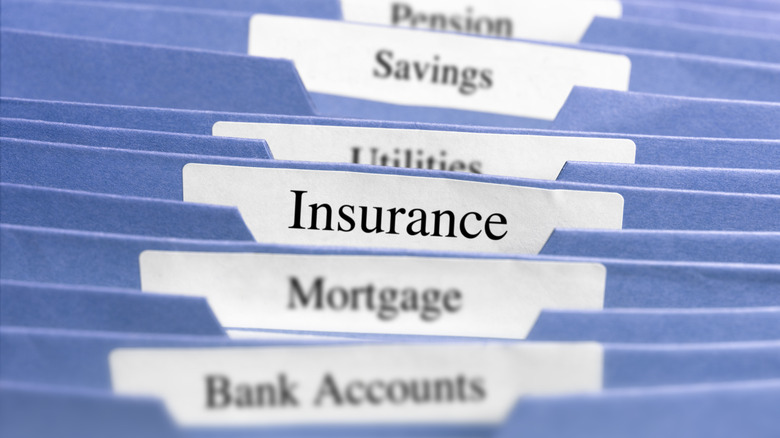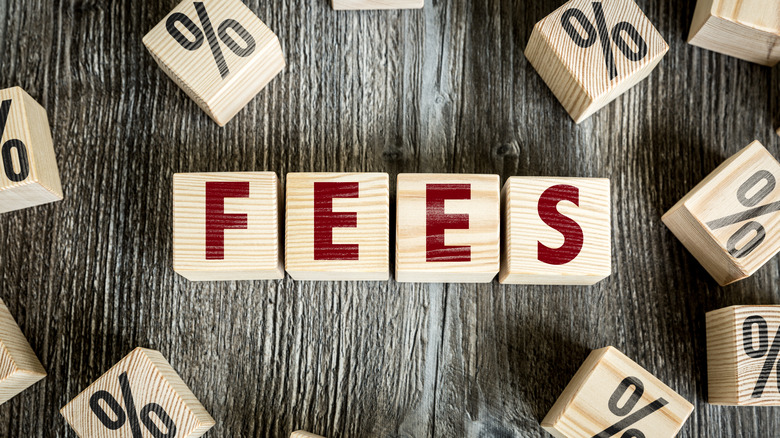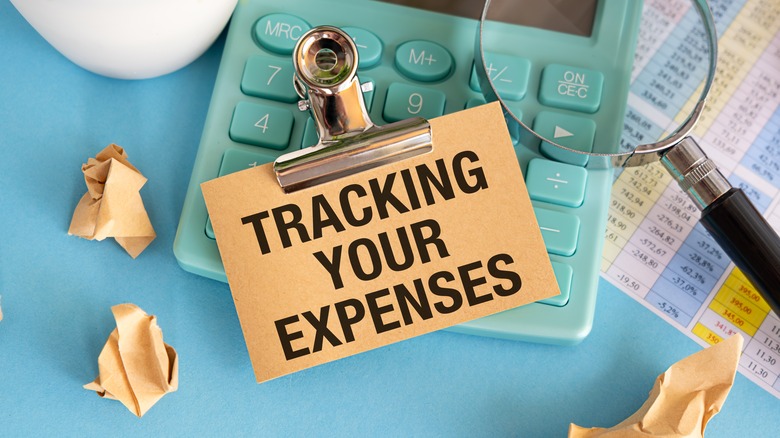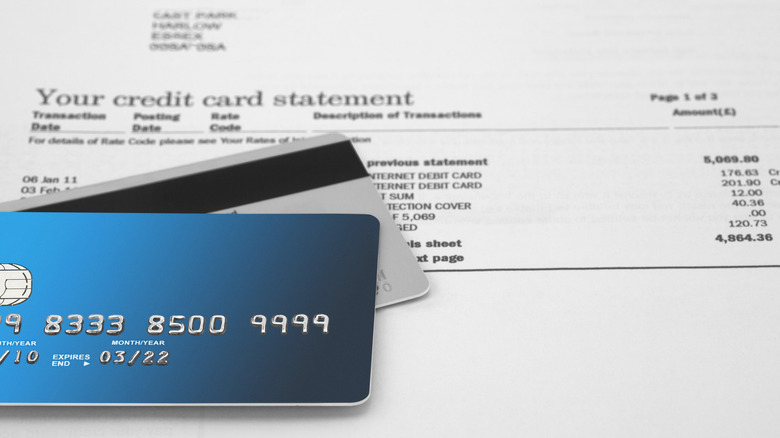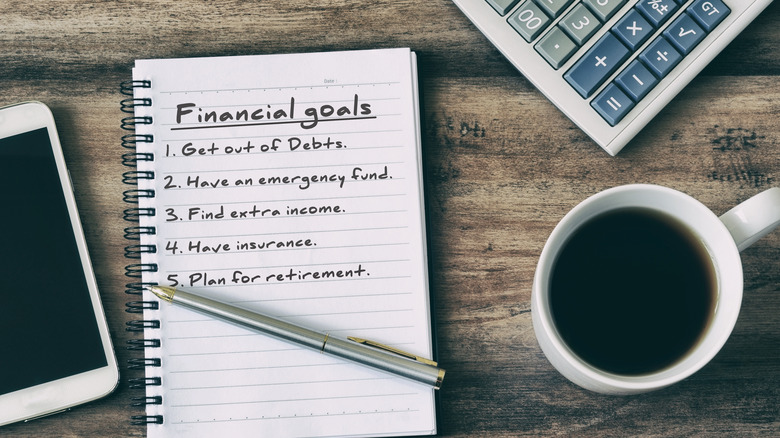Clear Signs You're Above Average Financially (Even If It Doesn't Feel That Way)
Trying times breed significant worry among the masses. No matter where you find yourself financially, the turmoil that has been thrust down upon the marketplace and consumers in recent years has made for plenty of grief. A Bankrate survey published July 1, 2024 notes that people feel overwhelmingly vulnerable with their financial picture, with 75% of Americans reportedly feeling "not completely financially secure." Americans see a monumental jump in salary as the ticket to changing this dilemma, with the average income hovering around $79,000 in 2022 but an identified target of at least $186,000 creating the feeling of stability.
Even with rampant insecurity pervading the American consumer mindset, there are actually a variety of causes for celebration among many in this cohort. There are a number of clear signs that you're "doing well" in terms of your finances, even if it might not always feel that way. Some financial pundits note things like zero debt as a key indicator of financial freedom (Dave Ramsey, among them). However, the indicators of good fiscal habits are far more manageable and won't require you to finagle your way out of something like a federal student loan bill, or pour blood sweat and tears into massive monthly repayments to eliminate a car payment or mortgage. These signs show that you're taking personal finance seriously; they can provide a calming effect if you're already doing them, and offer a way forward for those who aren't but are looking for greater financial control.
You've established a basic emergency savings
Your emergency fund should be a high priority, regardless of the other circumstances you find yourself in financially. This money should be placed in an account with easy access yet definitively separated from your routine spending cash. You might go to swap out one flat tire that turns into four necessary replacements or experience an injury that keeps you out of work for a few weeks. These kinds of setbacks are exactly what emergency savings are designed to tackle. Rather than relying on a credit card to get you through hard times, if you have cash ready to support you, your financial standing isn't directly affected unless a routine spending emergency turns into something far more invasive. With 56% of Americans lacking the ability to pay for a $1,000 expense from their savings, setting aside this cash can make all the difference in setting you apart.
If you have established a basic emergency fund, you won't need to rely on help from others to see you through hard times. Likewise, without having to rely on a personal loan or credit card to pay for a sudden expense, you don't have to worry about how you'll pay back the expenditure going forward. Of course, there's always the need to continue adding to your emergency fund, but if this is already a part of your budget then it doesn't require you to alter anything about your personal finances.
You save with intention
Saving is an important part of your budget, not just an afterthought. Many people consider their efforts at saving to be "paying themselves first," and this can be a powerful way to think about setting money aside. What this means is that you characterize your personal savings as a non-negotiable expense rather than an added budgetary feature that's nice to get to if other elements allow for it. Intentionally saving will set you up for success in multiple ways. For one thing, building an emergency fund requires a consistent effort to put aside cash and leave it there for a rainy day. But this isn't the only way to prioritize saving for the future.
Saving with intention also helps people dream about big things for their future. This might include moving into a new home or purchasing a new car that's more comfortable or larger in an effort to accommodate a growing family. Saving with intention also means understanding how to achieve these kinds of financial goals and then taking steps to turn them into a reality. If you've developed a framework for how to reach an important milestone on your journey toward a spending goal like this, then you are ahead of the curve financially.
You know your credit score and routinely monitor reports
Many people never pull their credit reports. In fact, some don't know the difference between their credit report and the information shown around the credit score on a credit card app. People who are managing their finances efficiently will understand not only what their credit report is but also how to access one. If you have pulled a credit report before, you're far ahead in terms of money management. However, if you are new to the world of credit monitoring then even the simple act of reviewing changes to your basic credit information through your credit card provider can be an important sign of financial stability. This interim step is easy to enact and simple to maintain, so it's a great step in the right direction for someone looking to improve their financial standing.
Your full credit report can be accessed for free, and this is an activity that everyone should regularly engage with. All three of major credit bureaus are required to provide consumers with a copy of their credit report for free on a yearly basis. This means that you can pull your credit report from each of the bureaus, and spreading this activity out across the year allows you to catch a glimpse of any discrepancies every four months. You can't fix what you don't see, so evaluating your credit report on a regular basis can help catch fraudulent activity or inaccurate information before it becomes truly damaging.
You pay your bills on time
You might feel a squeeze from time to time, and this reality is a true sign of normality in the present day. However, if you don't miss a bill then you are doing exceedingly well. MarketWatch reports that roughly 40% struggle to pay their typical household bills, and Motley Fool notes that 11.2% of the U.S. population had missed one or more credit card payments in the last year. These numbers suggest a growing instability in the American consumer marketplace, with inflation and other financial hardships stifling opportunity for plenty.
Even though the occasional lean month may be felt in your household, if you are consistently able to pay your bills on time then you are actually in good financial shape. Moreover, a smart consumer might consider options to reduce their monthly bills, especially if a pinch appears to be coming into the picture. Whether it's the use of coupons and discount offers across your routine purchases, or calling up your phone or internet provider to suggest a switch you can't get a price cut, many frugal approaches exist to help you maintain your quality of life without having to sacrifice too much.
You have invested in necessary insurance coverages
There are plenty of insurance products that are actually a waste of money, including, surprisingly, pet insurance in many instances. But insurance coverage can be a gigantic form of assistance. Policies like health insurance will protect you in the event that you fall ill. With healthcare costs continuing to act as a leading cause of consumer bankruptcy filings (responsible for around 40% of all filings in 2000 and 66.5% in 2019) , protecting yourself financially in the event of sudden sickness is something that every American should take seriously. But health insurance isn't the only lifeline feature in your financial planning.
Americans with policies that cover other crisis events position themselves well in the event of a sudden emergency that requires a financial fall back. Life insurance, for instance, is a great option for those with young families who worry over how to make ends meet if one parent were to lose the ability to work or even pass away. In another vein, homeowners' insurance and car insurance offer protection options that help keep your property safe and your vehicle on the road. Thinking of targeted insurance coverages as essential expenses rater than additional things to pay for is a mindset that places you firmly in the category of financial stability.
You can afford prioritized 'wants'
If you are able to reasonably afford going on vacation or dining out on a somewhat consistent basis then you are actually in a good financial position. Just getting out of the house and experiencing these kinds of things is a sign that you're on the right track. Social media is a primary culprit in creating an atmosphere of jealousy and FOMO. There's always someone with a nicer car, a better view from their hotel room, or a fancier dinner reservation. This comparison game leads many to think that they aren't stable or don't have what they need. But the reality couldn't be further from the truth. Financial stability isn't measured in penthouse suite hotel rooms and glorious dinner spreads.
Indeed, these kinds of experiences wouldn't even be all that satisfying for many, and the luxurious trappings can actually take away from the other relationship building experiences that come along with a vacation or night out. Going out to your favorite restaurant to share a meal with people who matter the most to you is truly more reward than dressing up for a fancy night with massively expensive drinks and a tiny plate of food while surrounded by people whose opinion you don't need. A luxury experience might be a nice thing to target once in a while, but it should never be a standard goal that sacrifices routine experiences with loved ones.
Your net worth increases on a yearly basis
Net worth is an oddity in some senses. For many, this isn't something that's actively considered on a regular basis. Yet, your net worth is certainly something that's important to at least keep vague track of throughout the year. In fact, yearly progression is a metric that can help consumers take stock of their money management skills over time. A net worth that generally rises on a yearly basis is the outcome that every consumer is looking for. Yearly net worth increases mean that you aren't adding overwhelming new debts into the mix or treading water on your home equity statistics. Positive change signals good debt management habits and a solid strategy for saving and building up value in your investments, emergency fund, and elsewhere.
Net worth, at its most basic, is the collective accounting of your financial life. All the cash and assets you have to your name weighed against the debts you've collected. It's not uncommon — or even all that troublesome — for young people to experience a negative figure here. Student loan debt is often significant for recent graduates, with the typical borrower in the U.S. owing back $37,850 in federal loans and the average four-year degree seeker borrowing $30,500 (based on 2019-2020 figures). The same negative pressure weighs down on recent homebuyers. But over time loans are repaid and mortgages tip in favor of the buyer. If you're moving in a positive direction, you're doing well.
You aren't paying any bank fees
Banks have often charged fees in the past that disproportionately affect lower income individuals. "Maintenance fees" tend to focus their attention on low usage accounts and those with lower revolving balances. But more troubling is the marketplace for overdraft fees. According to research from Harvard Business School, banks often use a high-to-low ordering system for processing transactions. For a vulnerable account with limited funds, this can result in an overdraft on the first of a series of debits, with subsequent over-limit fees tacked on for each additional debit. If you have three bills that come out on the same day, for instance, there might be enough money in the account to handle two of them, but if the largest is withdrawn first it can disrupt all three transactions.
Regardless of the fee types you've fallen prey to in the past, it's entirely possible to avoid them and other bank fees going forward. Switching to a bank that doesn't charge fees is a catchall measure that virtually any consumer can take. If you're working with a financial institution that isn't out to get you (the overdraft fee alone earned predatory banks $33 billion in 2018), then you can breathe easier with every purchase and bill paid. Shifting transactions to different dates is another way to short circuit the potentially hazardous effects of this ordering system. Many banks also waive costs when opening a savings account as well, or having paychecks direct deposited.
You use a budget to track finances
It might seem silly to say, but budget tracking that helps you spend less than you earn is a major change that consumers can make when looking to put themselves into a better financial position. 40% of Americans say they've never made a budget and 59% say they don't track their spending, according to a 2019 CFP Board survey. These numbers suggest a definitive weakness in the average consumer's daily monetary habits. Fortunately, there's a truly simple way to fix this problem.
Building a budget doesn't take very long. It can be a daunting process the first time you engage with it, but it's not a difficult task if you work at it with transparency and honesty. Go through your payment option statements and add up the total you spent during the last month — it can be a good idea to reach back over two or three months to create an average of your spending, as well. There are plenty of unavoidable bills like electricity, internet, and your phone. But you'll notice a decent volume of discretionary categories that might be significantly malleable. For those already using a budget to track spending and financial stability, you're well ahead of the curve and should keep up the good work.
You pay off statement balances every month on your credit card
Responsible credit card management isn't just a key feature in building a good credit score. This practice is essential for those hoping to maintain positive cash flow in their budget, too. The best way to avoid interest costs and added financial stress through the use of a credit card is to pay off statement balances every month. Your best approach is to use a single credit card, this way you are able to focus on a single repayment rather than having to juggle many different numbers around in your head.
For those chasing rewards points on a revolving circuit, using one card one month and shifting to the next in the following month can be useful. But this is only a viable option for those who pay down their entire balance religiously. The alternative is a continuously building backlog of debt that may eventually swallow you whole. Your statement balance is the volume of usage that will be charged interest if it isn't paid in full by the end of the billing period. It's obviously a great goal to get back to zero at the end of every month, but this might not always be possible. An interim goal, and one that every credit card user should strive for, is a zeroed out statement balance figure. This way you avoid interest charges and can enjoy greater financial flexibility without tacked on costs interfering with your budgetary math.
You've clearly defined your financial goals
It's not enough to "save for retirement" or "set some money asid'e for a vacation." These are great starting points, to be sure, but they aren't measurable or deliverable. At no point can a saver decisively say they've completed their goal of saving for retirement" if it doesn't include any markers of success. Instead, a saver or spender will need to understand at least the basics of what they're looking to achieve and work these into their plan.
Many people think about trimming their budget, saving for retirement, or setting money aside to purchase a home. But without some defining features included to frame what these goals actually mean, it's easy to become lost at sea when chasing them down. You might start a home down payment savings goal by evaluating what your budget will look like. The average first-time buyer pays roughly 6% as a down payment, and others average about 17%, according to a 2022 study by the National Association of Realtors. If your budget is $400,000, you'll be looking to set aside $24,000 or $68,000, respectively. For a prospective buyer, this concrete figure can then be divided out across a target number of monthly savings contributions.

